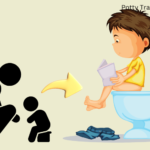In the tapestry of family life, the role of fathers has evolved significantly, moving beyond the traditional breadwinner archetype to embrace a more hands-on approach in childcare. This shift towards shared parenting not only enriches the family dynamic but also plays a pivotal role in the holistic development of children. Let’s delve into why paternal involvement is indispensable in childcare and how it can be fostered to benefit both children and parents alike.

The Bedrock of Child Development
Paternal involvement is not just about spending time with children; it’s about actively contributing to their emotional, social, and cognitive development. Research has consistently shown that when fathers are engaged, children exhibit higher levels of psychological well-being, show better social skills, and are more likely to excel academically.
Emotional Well-being
A father’s presence provides a unique sense of security and stability, nurturing a child’s emotional intelligence. Activities as simple as reading bedtime stories or engaging in heart-to-heart conversations can fortify a child’s self-esteem and foster resilience against mental health challenges.
Cognitive Growth
Dads play a crucial role in stimulating cognitive development through interactive play, problem-solving activities, and encouraging curiosity. Their different approaches to play and exploration can complement maternal care, offering children a broader perspective and diverse problem-solving strategies.
Social Skills
The interaction between fathers and their children also lays the foundation for robust social skills. Through play and daily interactions, children learn to navigate social dynamics, understand emotional cues, and develop empathy, preparing them for the complexities of social relationships.
Enhancing Family Dynamics
Shared parenting, where caregiving responsibilities are evenly distributed, leads to a more balanced and harmonious family life. It alleviates the stress on mothers, promotes equality in parental roles, and strengthens the marital relationship, creating a nurturing environment for children.
Strengthening Father-Child Bonds
Engaging in bonding activities, such as shared hobbies or family outings, deepens the emotional connection between fathers and their children, fostering a sense of belonging and support.
The Ripple Effect on Education
Paternal involvement has a profound impact on a child’s educational journey. From homework help to attending school events, fathers who actively participate in their child’s education tend to raise children who perform better academically and have a higher likelihood of pursuing higher education.

Actionable Tips for Increasing Father Participation in Childcare
- Be Present: Make a conscious effort to be physically and emotionally available for your children. Dedicate specific times for family activities and ensure you’re actively engaged.
- Share the Load: Collaborate with your partner to share household and childcare responsibilities. This not only models teamwork for your children but also supports your partner.
- Encourage Exploration: Take the lead in introducing your child to new experiences and hobbies. Whether it’s a sport, musical instrument, or a science project, exploring new activities together can be a rewarding experience.
- Open Communication: Foster an environment where open and honest communication is encouraged. Listen to your child’s thoughts and feelings without judgment, offering guidance when needed.
- Seek Resources: Don’t hesitate to seek out parenting resources, join father-focused groups, or attend workshops. Learning from others can provide new insights and strategies for effective parenting.
- Flexible Work Arrangements: If possible, explore flexible work options to ensure you can participate in important moments and responsibilities in your child’s life.
Overcoming Challenges
Despite the clear benefits, fathers may face barriers to increased involvement, from societal expectations to personal insecurities about parenting. Overcoming these challenges requires a societal shift in how we perceive and value the role of fathers in childcare, as well as personal commitment from dads to prioritize their family role.
Deconstructing Stereotypes
Challenging traditional stereotypes about gender roles in parenting is crucial. Fathers are equally capable of providing care, affection, and guidance. Society, workplaces, and communities need to support and celebrate paternal involvement.
Support Systems
Creating support systems, both within the family and externally through community and workplace initiatives, can facilitate fathers’ active involvement. Encouraging paternity leave, flexible working hours, and father-friendly parenting networks can make a significant difference.
Conclusion
The importance of paternal involvement in childcare cannot be overstated. It benefits children, mothers, fathers, and society by fostering happier, healthier, and more resilient families. By embracing shared parenting, fathers can contribute to their children’s development in profound ways, ensuring a legacy of love, learning, and emotional well-being. Let’s champion the role of dads in childcare, recognizing it as not just a responsibility but a privilege that enriches the entire family.
FAQs
How does paternal involvement specifically benefit children’s development?
Paternal involvement plays a significant role in a child’s emotional, social, and cognitive development. Engaged fathers contribute to higher levels of psychological well-being in children, better social skills, and academic excellence. A dad’s unique interaction style, including interactive play and problem-solving, complements maternal care, enriching a child’s learning environment and promoting a well-rounded development.
In what ways does shared parenting enhance family dynamics?
Shared parenting leads to a more balanced and harmonious family life by distributing caregiving responsibilities evenly between parents. This collaboration reduces stress on mothers, promotes equality in parental roles, strengthens the marital relationship, and creates a supportive and nurturing environment for children. Additionally, engaging in bonding activities deepens the emotional connection between fathers and their children, reinforcing a strong family unit.
What actionable tips can fathers follow to increase their participation in childcare?
Fathers looking to increase their participation in childcare can follow several actionable tips:
- Be Present: Dedicate specific times for family activities and ensure active engagement with your children.
- Share the Load: Collaborate with your partner to share household and childcare responsibilities, modeling teamwork for your children.
- Encourage Exploration: Lead in introducing your child to new experiences and hobbies, enriching their learning and bonding over shared activities.
- Open Communication: Foster an environment of open and honest communication, listening to your child’s thoughts and feelings without judgment.
- Seek Resources: Utilize parenting resources, join father-focused groups, or attend workshops for new insights and effective parenting strategies.
- Flexible Work Arrangements: Explore flexible work options to be more involved in your child’s life and important moments.







